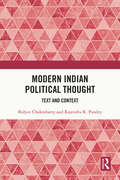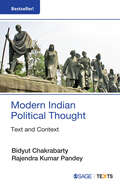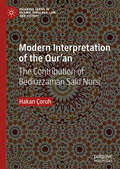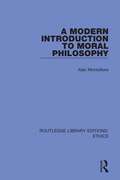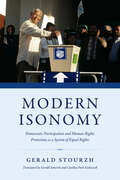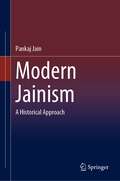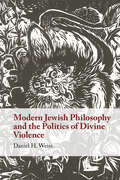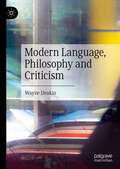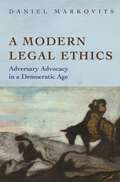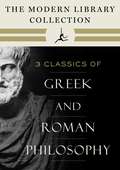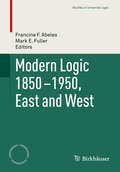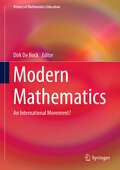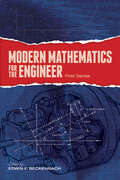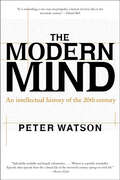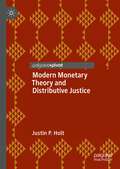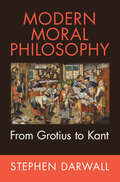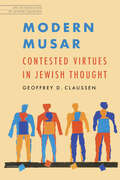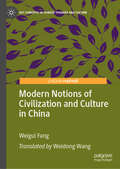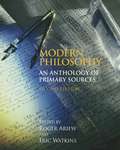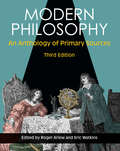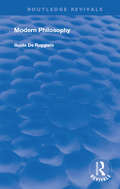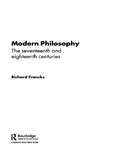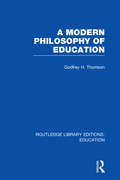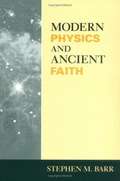- Table View
- List View
Modern Indian Political Thought: Text and Context
by Bidyut Chakrabarty Rajendra K. PandeyThis book is an unconventional articulation of the political thinking in India in a refreshingly creative manner in more than one way. Empirically, the book becomes innovative by providing an analytically more grasping contextual interpretation of Indian political thought that evolved during the nationalist struggle against colonialism. Insightfully, it attempts to unearth the hitherto unexplored yet vital subaltern strands of political thinking in India as manifested through the mode of numerous significant socio-economic movements operating side by side and sometimes as part of the mainstream nationalist movement. This book articulates the main currents of Indian political thought by locating the text and themes of the thinkers within the socio-economic and politico-cultural contexts in which such ideas were conceptualised and articulated. The book also tries to analytically grasp the influences of the various British constitutional devices that appeared as the responses of the colonial government to redress the genuine socio-economic grievances of the various sections of Indian society. The book breaks new ground in not only articulating the main currents of Indian political thought in an analytically more sound approach of context-driven discussion but also provokes new research in the field by charting a new course in grasping and articulating the political thought in India. This volume will be useful to the students, researchers and faculty working in the fields of political science, political sociology, political economy and post-colonial contemporary Indian politics in particular. It will also be an invaluable and interesting reading for those interested in South Asian studies.
Modern Indian Political Thought: Text and Context (SAGE Texts)
by Bidyut Chakrabarty Rajendra Kumar PandeyModern Indian Political Thought: Text and Context is an essential reading for students of social sciences seeking to unravel the formation and text of the thoughts of great Indian political thinkers. It is an unconventional articulation of the political thought in India that evolved during the nationalist struggle against colonialism. The salient features of the book are: - In contrast to the existing literature on the subject, it carries a context-driven conceptualisation of the major strands of political thought that emerged in India in the past two centuries. It focuses on India's peculiar socio-political processes under colonialism that influenced the evolution of such thought. - Incorporates new ideas and issues that have been articulated, though not as extensively, in contemporary works on Indian nationalist thought and movement. - Discusses the development and articulation of political thought by leaders like Gandhi, Tagore, Ambedkar, JP, Nehru and Lohia. - Covers the Indian freedom struggle in detail. The distinguishing feature of this book is its linking of the text of Indian political thought with the context. In doing so, it challenges the ethno-centric interpretation of nationalism that, despite its roots in Western Enlightenment, evolved differently because of the context in which it was articulated.
Modern Interpretation of the Qur’an: The Contribution of Bediuzzaman Said Nursi (Palgrave Series in Islamic Theology, Law, and History)
by Hakan ÇoruhThis book analyzes the distinguished modern Muslim scholar Bediuzzaman Said Nursi and the methodology of Qur’anic exegesis in his Risale-i Nur Collection, with special reference to the views of the early Muslim modernist intellectuals such as Muhammad ‘Abduh. It seeks to locate Nursi within modern Qur’anic scholarship, exploring the difference between Nursi’s reading of the Qur’an and that of his counterparts, and examines how Nursi relates the Qur’anic text to concerns of the modern period.
A Modern Introduction to Moral Philosophy
by Alan MontefioreOriginally published in 1958, this book shows how a systematic consideration of what exactly may be meant by calling anything ‘good’, inevitably leads on to the more general and fundamental problem of the relations between value-judgments and statements of fact. It does on to explain some of the difficult and far-reaching issues which this problem involves. The book is intended as an introduction for students interested in finding out the nature and point of modern methods of philosophic analysis when applied to problems of moral philosophy.
Modern Isonomy: Democratic Participation and Human Rights Protection as a System of Equal Rights
by Gerald StourzhUntil the eighteenth century, Western societies were hierarchical ones. Since then, they have transformed themselves into societies dominated by two features: participatory democracy and the protection of human rights. In Modern Isonomy, distinguished political theorist Gerald Stourzh unites these ideas as “isonomy.” The ideal, Stourzh argues, is a state, and indeed a world, in which individual rights, including the right to participate in politics equally, are clearly defined and possessed by all. Stourzh begins with ancient Greek thought contrasting isonomy—which is associated with the rule of the many—with “gradated societies,” oligarchies, and monarchies. He then discusses the American experiment with the development of representative democracy as well as the French Revolution, which proclaimed that all people are born and remain free and with equal rights. But progress on the creation and protection of rights for all has been uneven. Stourzh discusses specifically the equalization of slaves, peasants, women, Jews, and indigenous people. He demonstrates how deeply intertwined the protection of equal rights is with the development of democracy and gives particular attention to the development of constitutional adjudication, notably the constitutional complaint of individuals. He also discusses the international protection human rights. Timely and thought-provoking, Modern Isonomy is an erudite exploration of political and human rights.
Modern Jainism: A Historical Approach
by Pankaj JainThis book presents a substantive yet accessible introduction to the modern thought of Jainism. It examines the life and thought of some of the most influential 19th and 20th-century Jain ascetic leaders that remain little known in the Western world. The book's first part provides a detailed philosophical overview of Jain thought based on the translation of a seminal Hindi text Jain Darshan. The second part introduces eight Jain saints from the major Jain sects, including their biographies, philosophical perspectives, and related contemporary movements flourishing in various places across India and beyond. The author also shares his ethnographic experiences in several chapters. Furthermore the book provides a detailed glossary of terms in Sanskrit, Prakrit, Hindi, Gujarati, and Rajasthani and their English meanings. An indispensable book that offers innovative insights into several crucial Jain movements and how they helped shape modern Indian society and beyond. The book includes historical, philological, and anthropological accounts of modern Jainism.
Modern Jewish Theology: The First One Hundred Years, 1835–1935 (JPS Anthologies of Jewish Thought)
by Samuel J. Kessler George Y. KohlerModern Jewish Theology is the first comprehensive collection of Jewish theological ideas from the pathbreaking nineteenth and early twentieth centuries, featuring selections from more than thirty of the most influential Jewish thinkers of the era as well as explorations of Judaism&’s identity, uniqueness, and relevance; the origin of ethical monotheism; and the possibility of Jewish existentialism. These works—most translated for the first time into English by top scholars in modern Jewish history and philosophy—reveal how modern Jewish theology developed in concert with broader trends in Jewish intellectual and social modernization, especially scholarship (Wissenschaft des Judentums), politics (liberalism and Zionism), and religious practice (movement Judaism and the struggles to transcend denominational boundaries). This anthology thus opens to the English-language reader a true treasure house of source material from the formative years of modern Jewish thought, bringing together writings from the very first generations, who imagined biblical and rabbinic texts and modern scientific research would produce a synthetic view of God, Israel, and the world. A general introduction and chapter introductions guide students and nonspecialists through the key themes and transformations in modern Jewish theology, and extensive annotations immerse them in the latest scholarship.
Modern Language, Philosophy and Criticism
by Wayne DeakinThis books delineates the seismic shifts of the twentieth century humanities by way of a close examination of the dynamic landscape of modern language, criticism and philosophy. In this manner, it argues that both philosophy and literary criticism have dovetailed in the twenty-first century. Starting out as a survey of literary criticism in its broadest terms, later chapters - which are more expository - assess recent movements within modern literary theory. These are located with respect to the post-Russell and Fregean “linguistic turn” in philosophy. Designed for specialists and non-specialists alike; philosophers, literary critics and even students of the modern critical tradition, the argument takes a novel stance towards modern criticism, language and philosophy, arguing for a return to a more formalist and rhetorical approach to literary criticism, while taking care not to indulge too many “political pathologies” when engaging with texts.
A Modern Legal Ethics: Adversary Advocacy in a Democratic Age
by Daniel MarkovitsA Modern Legal Ethics proposes a wholesale renovation of legal ethics, one that contributes to ethical thought generally. Daniel Markovits reinterprets the positive law governing lawyers to identify fidelity as its organizing ideal. Unlike ordinary loyalty, fidelity requires lawyers to repress their personal judgments concerning the truth and justice of their clients' claims. Next, the book asks what it is like--not psychologically but ethically--to practice law subject to the self-effacement that fidelity demands. Fidelity requires lawyers to lie and to cheat on behalf of their clients. However, an ethically profound interest in integrity gives lawyers reason to resist this characterization of their conduct. Any legal ethics adequate to the complexity of lawyers' lived experience must address the moral dilemmas immanent in this tension. The dominant approaches to legal ethics cannot. Finally, A Modern Legal Ethics reintegrates legal ethics into political philosophy in a fashion commensurate to lawyers' central place in political practice. Lawyerly fidelity supports the authority of adjudication and thus the broader project of political legitimacy. Throughout, the book rejects the casuistry that dominates contemporary applied ethics in favor of an interpretive method that may be mimicked in other areas. Moreover, because lawyers practice at the hinge of modern morals and politics, the book's interpretive insights identify--in an unusually pure and intense form--the moral and political conditions of all modernity.
The Modern Library Collection of Greek and Roman Philosophy: 3-Book Bundle
by Plato Aristotle Marcus AureliusIn the long history of philosophy and literature, few have been so widely read and admired as the great thinkers of Greece and Rome. For modern audiences, this eBook bundle--which collects the Modern Library editions of three classics: Marcus Aurelius' Meditations, Selected Dialogues of Plato, and The Basic Works of Aristotle--is the perfect introduction to the foundation of modern knowledge. Accompanied by insightful, accessible commentary from some of today's top scholars, including Gregory Hays, Hayden Pelliccia, and C.D.C. Reeve, this is a collection of ideas that changed the world--and have truly stood the test of time. MEDITATIONS Marcus Aurelius succeeded his adoptive father as emperor of Rome in A.D. 161--and Meditations remains one of the greatest works of spiritual and ethical reflection ever written. The Meditations have become required reading for statesmen and philosophers alike, while generations of readers have responded to the straightforward intimacy of the leader's style. In Gregory Hays's seminal translation, Marcus's thoughts speak with a new immediacy: Never before have they been so directly and powerfully presented. SELECTED DIALOGUES OF PLATO In this volume, Hayden Pelliccia has revised five of Benjamin Jowett's translations of Plato--classics in their own right--to produce a fresh, modern take that Library Journal calls "a needed and welcome addition to the translations of the Dialogues." Here are Ion, Protagoras, Phaedrus, and the famous Symposium, which discuss poetry, the Socratic method, rhetoric, psychology, and love. Most dramatically, Apology puts Socrates' art of persuasion to the ultimate test--defending his own life. THE BASIC WORKS OF ARISTOTLE Preserved by Arabic mathematicians and canonized by Christian scholars, Aristotle's works have shaped Western thought, science, and religion for nearly two thousand years--and Richard McKeon's edition has long been considered the best available one-volume Aristotle. Here are selections from the Organon, On the Heavens, The Short Physical Treatises, Rhetoric, among others, and On the Soul, On Generation and Corruption, Physics, Metaphysics, Nicomachean Ethics, Politics, and Poetics in their entirety.
Modern Logic 1850-1950, East and West
by Francine F. Abeles Mark E. FullerThis book presents diverse topics in mathematical logic such as proof theory, meta-mathematics, and applications of logic to mathematical structures. The collection spans the first 100 years of modern logic and is dedicated to the memory of Irving Anellis, founder of the journal 'Modern Logic', whose academic work was essential in promoting the algebraic tradition of logic, as represented by Charles Sanders Peirce. Anellis's association with the Russian logic community introduced their school of logic to a wider audience in the USA, Canada and Western Europe. In addition, the collection takes a historical perspective on proof theory and the development of logic and mathematics in Eastern Logic, the Soviet Union and Russia. The book will be of interest to historians and philosophers in logic and mathematics, and the more specialized papers will also appeal to mathematicians and logicians.
Modern Mathematics: An International Movement? (History of Mathematics Education)
by Dirk De BockThe international New Math developments between about 1950 through 1980, are regarded by many mathematics educators and education historians as the most historically important development in curricula of the twentieth century. It attracted the attention of local and international politicians, of teachers, and of parents, and influenced the teaching and learning of mathematics at all levels—kindergarten to college graduate—in many nations. After garnering much initial support it began to attract criticism. But, as Bill Jacob and the late Jerry Becker show in Chapter 17, some of the effects became entrenched.This volume, edited by Professor Dirk De Bock, of Belgium, provides an outstanding overview of the New Math/modern mathematics movement. Chapter authors provide exceptionally high-quality analyses of the rise of the movement, and of subsequent developments, within a range of nations. The first few chapters show how the initial leadership came from mathematicians in European nations and in the United States of America. The background leaders in Europe were Caleb Gattegno and members of a mysterious group of mainly French pure mathematicians, who since the 1930s had published under the name of (a fictitious) “Nicolas Bourbaki.” In the United States, there emerged, during the 1950s various attempts to improve U.S. mathematics curricula and teaching, especially in secondary schools and colleges. This side of the story climaxed in 1957 when the Soviet Union succeeded in launching “Sputnik,” the first satellite. Undoubtedly, this is a landmark publication in education. The foreword was written by Professor Bob Moon, one of a few other scholars to have written on the New Math from an international perspective. The final “epilogue” chapter, by Professor Geert Vanpaemel, a historian, draws together the overall thrust of the volume, and makes links with the general history of curriculum development, especially in science education, including recent globalization trends.
Modern Mathematics for the Engineer: First Series (Dover Books on Engineering)
by Edwin F. Beckenbach Royal WellerThis volume and its successor were conceived to advance the level of mathematical sophistication in the engineering community. The books particularly focus on material relevant to solving the kinds of mathematical problems regularly confronted by engineers. Suitable as a text for advanced undergraduate and graduate courses as well as a reference for professionals, Volume One's three-part treatment covers mathematical models, probabilistic problems, and computational considerations. Contributions include chapters on linear and nonlinear oscillations by Solomon Lefschetz, on hyperbolic partial differential equations and applications by Richard Courant, and on the theory of prediction by Norbert Wiener. Additional topics include game theory, applied mathematics in operations research, matrices, conformal mapping methods, and other subjects involving the intersection of engineering and mathematics.
The Modern Mind: An Intellectual History of the 20th Century
by Peter Watson“Splendidly readable and hugely informative. . . . Episode after episode from the cultural life of the twentieth century springs to vivid life.” —Boston GlobeFrom Freud to Babbitt, from Animal Farm to Sartre to the Great Society, from the Theory of Relativity to counterculture to Kosovo, The Modern Mind is encyclopedic, covering the major writers, artists, scientists, and philosophers who produced the ideas by which we live. Peter Watson has produced a fluent and engaging narrative of the intellectual tradition of the twentieth century, and the men and women who created it.“Watson’s rich narrative covers every corner of intellectual life in the twentieth century.” —Publishers Weekly“Packed with a multitude of events, ideas, and influential people, Watson’s infectious writing carries the reader swiftly along. . . . This book will be read and consulted for many years.” —Library Journal “Enthralling, illuminating, and intellectually titillating.” —Booklist
Modern Monetary Theory and Distributive Justice
by Justin P. HoltModern Monetary Theory and Distributive Justice shows how the macroeconomic framework called modern money theory (MMT) is relevant to the field of political philosophy called distributive justice. Many of the macroeconomic assumptions of distributive justice are unstated and unexamined. The framework of MMT illuminates these assumptions and provides an alternative vision of distributive justice analysis and prescriptions. In particular, MMT holds that modern money is a nominal state issued token (fiat), there is a distinction between nominal assets and real assets, that state money as a nominal token can cause changes in real terms, and that the macroeconomy has historically not operated at capacity. The upshot of these assumptions held by MMT is that state spending can bring about changes in persons’ well-being without traditional redistributive measures via taxation. This is in contradistinction to standard assumptions in the distributive justice literature, which holds that the macroeconomy is at capacity and, thus, redistribution is the necessary mechanism for enacting improvements in well-being. This is a fundamental shift in how distributive justice can be conceived.
Modern Moral Philosophy: From Grotius to Kant
by Stephen DarwallIn this magisterial study, one of our leading moral philosophers refutes the charge (originally made by Elizabeth Anscombe) that modern ethics is incoherent because it essentially depends on theological and religious assumptions that it cannot acknowledge. Stephen Darwall's panoramic picture starts with the seventeenth-century thinker Grotius and tells the story continuously down to the time of Kant, exploring what was in fact a completely new way of doing ethics based on secular ideas of human psychology and universal accountability. He shows that thinkers from Grotius to Kant are profoundly united by this modern approach, and that it helped them to create a theory of natural human rights that remains of great political relevance today. He further shows that this new way of thinking provides conceptual resources that are far from exhausted, and that moral philosophy in this idiom still has a vibrant future.
Modern Musar: Contested Virtues in Jewish Thought (JPS Anthologies of Jewish Thought)
by Geoffrey D. ClaussenHow do modern Jews understand virtues such as courage, humility, justice, solidarity, or love? In truth: they have fiercely debated how to interpret them. This groundbreaking anthology of musar (Jewish traditions regarding virtue and character) explores the diverse ways seventy-eight modern Jewish thinkers understand ten virtues: honesty and love of truth; curiosity and inquisitiveness; humility; courage and valor; temperance and self-restraint; gratitude; forgiveness; love, kindness, and compassion; solidarity and social responsibility; and justice and righteousness. These thinkers—from the Musar movement to Hasidism to contemporary Orthodox, Reform, Conservative, Reconstructionist, Renewal, Humanist, and secular Jews—often agree on the importance of these virtues but fundamentally disagree in their conclusions. The juxtaposition of their views, complemented by Geoffrey Claussen&’s pointed analysis, allows us to see tensions with particular clarity—and sometimes to recognize multiple compelling ways of viewing the same virtue. By expanding the category of musar literature to include not only classic texts and traditional works influenced by them but also the writings of diverse rabbis, scholars, and activists—men and women—who continue to shape Jewish tradition, Modern Musar challenges the fields of modern Jewish thought and ethics to rethink their boundaries—and invites us to weigh and refine our own moral ideals.
Modern Notions of Civilization and Culture in China (Key Concepts in Chinese Thought and Culture)
by Weigui FangThis Key Concepts pivot examines the fundamental Chinese ideas of ‘Civilization’ and ‘culture’, considering their extensive influence both over Chinese society and East Asian societies. The pivot analyses the traditional connotations of those two concepts and their evolution in the Sino-Western exchanges as well as their renewed interpretation and application by contemporary Chinese scholars. It analyses how the years 1840-1900 which mark a period of major transition in China challenged these concepts, and highlights how the pursuit of innovation and international perspective gave birth to new values and paradigm shifts, and culminated in the May Fourth New Culture Movement. Considering the underlying humanistic ideas in the key concepts of traditional Chinese civilisation and culture, this pivot contributes to this series of Chinese Key Concept by offering a unique analysis of the conceptual evolutions brought about by the change of values in 21st century China.
Modern Philosophy
by Roger Ariew Eric WatkinsThe leading anthology of writings of the modern period, Modern Philosophy provides the key works of seven major philosophers, along with a rich selection of associated texts by other leading thinkers of the period, chosen to deepen the reader's understanding of modern philosophy and its relationship to the natural sciences. Building on the strengths of the first edition, the second edition of Modern Philosophy is enhanced by the addition of the following selections: Montaigne, Apology for Raymond Sebond, "The Senses Are Inadequate"; Newton, Principia, "General Scholium," and Optics, "Query 31"; Hume, Dialogues Concerning Natural Religion, Parts 1-5 and 9-12; Reid, Inquiry Into Human Mind, Conclusion, andEssays on the Intellectual Powers of Man,"Of Judgment,"chap. 2, Of Common Sense
Modern Philosophy: An Anthology of Primary Sources
by Roger Ariew Eric WatkinsThe most widely read anthology for the study of modern philosophy, this volume provides key works of philosophers and other leading thinkers of the period, chosen to enhance the reader&’s understanding of modern philosophy and its relationship to the natural sciences of the time. The third edition incorporates important contributions of women and minority thinkers into the canon of the modern period, while retaining all of the material of the previous edition. Included are works by Princess Elisabeth, Margaret Cavendish Duchess of Newcastle, Lady Anne Conway, Anton Wilhelm Amo, Lady Damaris Masham, Lady Mary Shepherd, and Emilie Marquise Du Châtelet.
Modern Philosophy (Routledge Revivals)
by Guido De RuggieroOriginally published in 1921, this volume represents De Ruggiero's first appearance in English, being the first time his philosophical works were translated. Modern Philosophy presents a positive philosophical position of great interest, avowedly in continuation of Croce and in close agreement with Gentile, which sums up the progress of Italian idealism down to the writing of this book. It is a remarkable piece of historical work, focusing on the development of European philosophy in the second half of the nineteenth century and the beginning of the twentieth, and was the first volume to comprehensively handle this time period.
Modern Philosophy: The Seventeenth And Eighteenth Centuries (Fundamentals of Philosophy)
by Richard FrancksModern Philosophy is an exploration of the ideas of six major thinkers from Descartes to Hume. It takes a fresh and engaging look at the common themes that dominate this period, as well as examining the differences in the work of the six philosophers.Through vivid and witty prose, Richard Francks skilfully presents ideas that have informed the development of philosophy as we know it, and which present a challenge to beliefs and attitudes that most of us now share. In this work we find the source of modern philosophical inquiry - questions such as the existence of God, the Mind and Body problem, the idea of self, and the existence of the world had their birth in these texts - as well as broader questions about political and social philosophy. Thinkers discussed:Rene DescartesBaruch SpinozaGottfried Willhelm LeibnizJohn LockeGeorge BerkeleyDavid HumeThis will be ideal for anybody coming to the ideas of these philosophers for the first time.
A Modern Philosophy of Education (Routledge Library Editions: Education)
by Godfrey Thomson‘Philosophy’ in the context of this book means that the author is looking at education as a whole, without restrictions or simplifications; looking at ends and purposes, not merely at methods and means. He discusses early years education, the sociology and psychology of education as well as education in adolescence and adult education. Well-known as a critical pioneer of intelligence research the author discusses educational psychology as much as philosophy in this book.
Modern Physics and Ancient Faith
by Stephen M. BarrA considerable amount of public debate and media print has been devoted to the "war between science and religion. " In his accessible and eminently readable new book, Stephen M. Barr demonstrates that what is really at war with religion is not science itself, but a philosophy called scientific materialism. Modern Physics and Ancient Faith argues that the great discoveries of modern physics are more compatible with the central teachings of Christianity and Judaism about God, the cosmos, and the human soul than with the atheistic viewpoint of scientific materialism. Scientific materialism grew out of scientific discoveries made from the time of Copernicus up to the beginning of the twentieth century. These discoveries led many thoughtful people to the conclusion that the universe has no cause or purpose, that the human race is an accidental by-product of blind material forces, and that the ultimate reality is matter itself. Barr contends that the revolutionary discoveries of the twentieth century run counter to this line of thought. He uses five of these discoveries--the Big Bang theory, unified field theories, anthropic coincidences, G#65533;del's Theorem in mathematics, and quantum theory--to cast serious doubt on the materialist's view of the world and to give greater credence to Judeo-Christian claims about God and the universe. Written in clear language, Barr's rigorous and fair text explains modern physics to general readers without oversimplification. Using the insights of modern physics, he reveals that modern scientific discoveries and religious faith are deeply consonant. Anyone with an interest in science and religion will find Modern Physics and Ancient Faith invaluable. "A modern physicist who writes with extraordinary clarity and verve, and is familiar with the intellectual arguments long used by the ancient faiths, Stephen Barr gives a brilliant defense of the integrity of science in the teeth of its most powerful modern bias, by telling the exciting story of the rise, complacency, and fall of scientific materialism. As his story crackles along, and just at the point of reaching really difficult concepts, he has a knack for inventing illustrations that make one's inner light bulbs flash again and again. " --Michael Novak, Winner of the 1994 Templeton Prize for Progress in Religion "Barr has produced a brilliant and authoritative defense of Biblical faith in the light of contemporary science. He perceives a serious conflict, not between modern physics and ancient faith, but between religion and materialism. I know of no other book that makes the case against materialism so lucidly, honestly, and deftly. " --Owen Gingerich, Harvard-Smithsonian Center for Astrophysics "Written from the viewpoint of an accomplished physicist, this book is an invaluable contribution to the growing interest in the relationship between science and religion. The arguments are rigorously logical and the documentation is excellent. " --Robert Scherrer, Ohio State University
